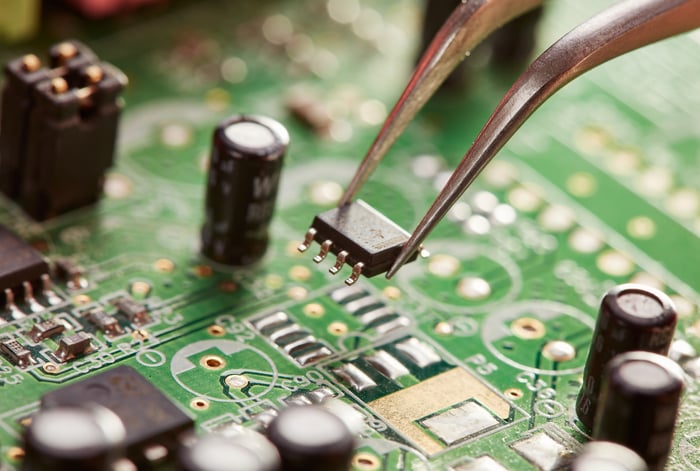Texas Instruments' (TXN 1.27%) stock is in the dog house today, down around 25% from its 52-week highs. That makes sense, given that the technology giant's financial results have been anything but inspiring. And yet, dividend-growth investors might want to step up today, given the historically high dividend yield of 3.6% and management's insistence in supporting its costly capital-spending plans. Here's what's going on.
Texas Instruments had a rough quarter, with more to come
In the third quarter, semiconductor chip maker Texas Instruments reported revenue of $4.53 billion and earnings per share of $1.85. Alone, those numbers aren't really meaningful. The top line was basically flat sequentially and down a huge 14% or so from the year-ago period. Earnings per share declined 25% year over year, dropping notably from $2.47 per share.

Image source: Getty Images.
This is not a business hitting on all cylinders today. And things aren't going to get any better from here, at least not through the end of the year. The company expects Q4 "revenue in the range of $3.93 billion to $4.27 billion and earnings per share between $1.35 and $1.57." That would compare to a top line of $4.67 billion and a bottom-line profit of $2.13 per share a year ago.
There's little wonder why the stock has come under so much selling pressure. However, it is important to note that the chip sector tends to be highly cyclical in nature. So the company's weak results aren't exactly abnormal, given that the broader chip sector is, indeed, pretty weak today. But there was one telling statement that came out of the Q3 earnings conference call: "The best time to be preparing for the upturn is before it shows up."
Texas Instruments is readying now with increased capital spending
The value of that statement in a cyclical industry can't be overstated. It is the same basic ethos that has driven steel giant Nucor to its industry-leading position. While there's little else similar between Nucor and Texas Instruments, both of them are steadfastly dedicated to investing for growth even through, perhaps particularly during, industry downturns. It's what sets them apart from their competitors.
Think about the logic. They are both working to build capacity before it is needed. That means they can take advantage of the upturn from Day 1, while competitors that pulled in the reins on capital spending are forced to play catch up.
Right now, Texas Instruments has material-spending plans. It is building new chip-fabrication plants that will require it to spend around $5 billion a year through 2026. It is important to remember that Texas Instruments' primary products are fairly simple chips that help to change physical events into digital ones (think pushing a button). They go into just about every device and have long product cycles and very long shelf lives. So getting ahead of an industry rebound is probably a less material issue than getting behind would be because of the risk of missing sales.
To be sure, spending so much money during an industry downturn will hurt the company's financial performance in the near term. So Texas Instruments' financial results could look ugly for a while longer. But when the chip upturn comes along, as upturns have historically, this technology giant will likely see financial results rebound strongly. Assuming that happens, Wall Street's view will probably change dramatically and in a positive direction.
A simple approach in a complex industry
Investing in technology can be hard to wrap your head around; for many investors, it may be better to outsource that effort. But Texas Instruments is something of a unique company in that it makes simple products, and has a long history of success and a very clear business approach. With a historically high yield from a company that has increased its dividend annually for two decades (at a compound annual rate of 18% over the past 10 years), even conservative, non-tech growth and income investors might want to take a closer look today ... before the upturn the company is preparing for now begins to take hold.




